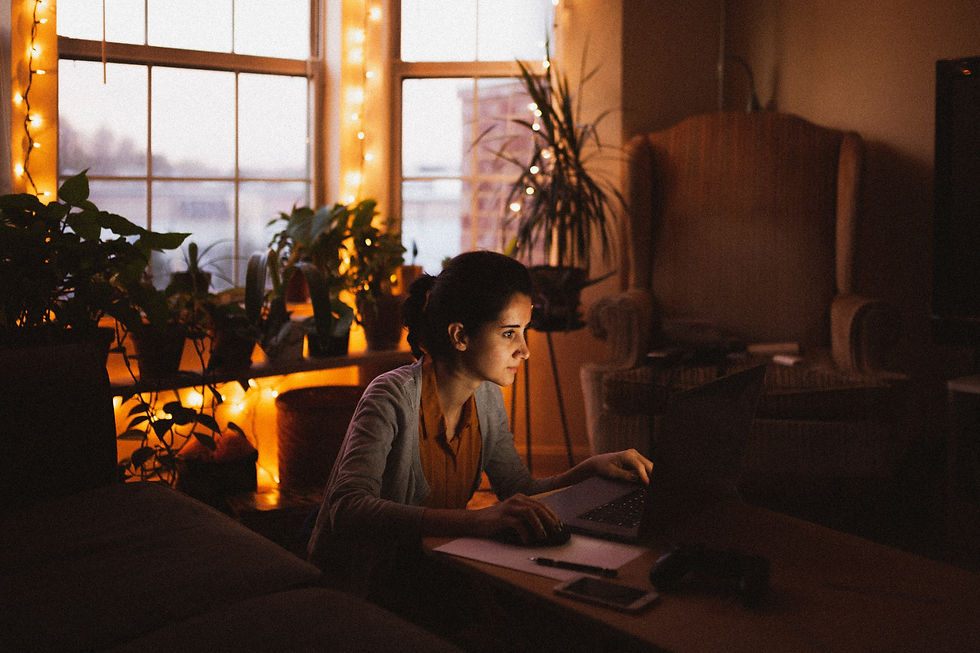Why our beloved electronics are bad for us
- Sumiye Allen

- Nov 13, 2020
- 4 min read
Updated: Oct 19, 2021
Unpopular opinion: screen time, while addicting, is something we should all cut down on.
Of course, no one can deny that technology comes with benefits. It connects people to education, news, and other resources, as well as the obvious—other people. It opens up options in all aspects of life. But it’s important to remember that moderation is key. Too much usage is not healthy, which is an issue because our devices are addicting.

Studies have found that on average, teens spend more than seven hours of their day on screens—and not only was this before the pandemic, it doesn’t even include the time used for school. Of course, this can vary greatly from person to person, but we generally spend a great deal of our day glued to electronics. “Pretty much all of my day is spent on a screen, whether it’s my laptop for schoolwork or it’s my phone to text friends or watch videos. It’s bad, my screen time for my phone in like the past week or something, I’ve spent like 23 hours on YouTube,” admits one ERHS freshman.
This is problematic because too much screen time can have negative effects on both our physical and mental wellbeing. The aforementioned freshman has certainly noticed them: “I get headaches, or I get dizzy. Like I’ll look away from a screen and my eyesight is all blurry,” she says. Another student reports that “I do notice negative effects; I get headaches pretty easily, especially when I have Zoom for a while.” And I’m sure they aren’t the only ones: a slight headache, a cramping neck, dry or blurry eyes have all been linked to technology. In fact, there is a name for some of these effects—computer vision syndrome, or CVS. No wonder there’s so much hype about blue light glasses (although it’s debatable whether they actually work or not).
Other conditions, such as hearing loss and carpal tunnel syndrome (which affects your hand/wrist), have also been found to be connected to technology use. Of course, electronics are not the only cause of these, nor are they automatically going to land you with anything, but overuse comes with risks. Don’t deny it—we’ve all felt at least some of these symptoms at one point. Screen time takes its toll on our bodies, however slight, whether we want it to or not.
And don’t forget our mental health! Technology has ushered in an era of connectivity, but it is also linked to depression, isolation, and low self esteem. The Internet connects us to the world, but it can also create a sense of isolation—a device is not a substitute for human interaction. Texting or chatting online is not the same as talking face to face. A Stanford study found that tweens who spent more time online also noticed deficits in their social skills.
Spending time on social media can also be detrimental to our self esteem—that’s something that’s well known. But a study by the American Medical Association (AMA) has also found that artificial light at night, which disrupts the circadian rhythm (our natural sleep-wake cycle), can exacerbate depression and other mood disorders. Meaning not only can social media have a negative effect on our mental health, but the light emitted from our devices can too.
The danger is in how easy it is to get sucked into our electronics. You tell yourself that you’ll only spend another 15 minutes on your phone, and then you end up spending an hour. You compulsively check social media. Even when you aren’t on your phone, you check it often for text messages. It can get so bad that it’s basically an addiction. In fact, although not officially recognized, it’s a thing: internet addiction disorder, or IAD (it also goes by other names).
Even if you don’t exactly have an addiction, technology is still extremely distracting.
“It’s also the cause of most of my procrastination. I mean it can be good, like being on a screen, we have access to the internet. It's like a whole world wide web with just knowledge and studying, but it can also lead you down rabbit holes of being distracted and not doing what you’re supposed to be doing,” says the first ERHS student. And that’s exactly right. Our devices are ever present sources of interest, which take away from school, homework, and simply daily life. Of course, this is not the case for everyone, as another student reports that they don’t get too distracted and are able to focus on what they need to do, but a great deal of people are part of the first group.

Knowing all this, it’s not hard to imagine why cutting back on screen time would be a good thing. It’s not that we should stop using our devices entirely—in fact, in our modern world that would be next to impossible—but we should make sure to avoid being glued to our screens all day long.
It’s harder to do so when virtual learning has made even school a technology reliant activity, but we can still try to cut down on our recreational use of electronics. Cut out a couple of video-watching hours or at least follow health guidelines and stop using your device half an hour before you go to sleep to keep your body on its natural timer. Take breaks to avoid straining your eyes. Practice good posture to avoid neck and back pain. Shut off your phone when in class, doing homework, or involved in some other activity that we need or want to focus on. We can all take simple steps like these to be responsible digital users.






Comments